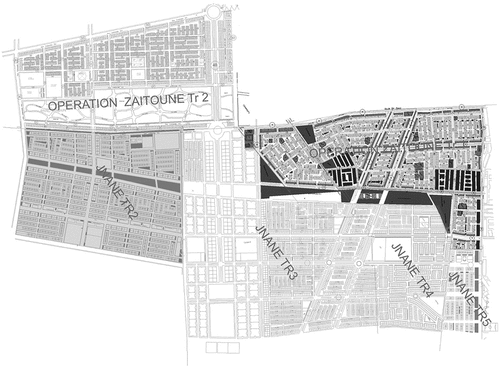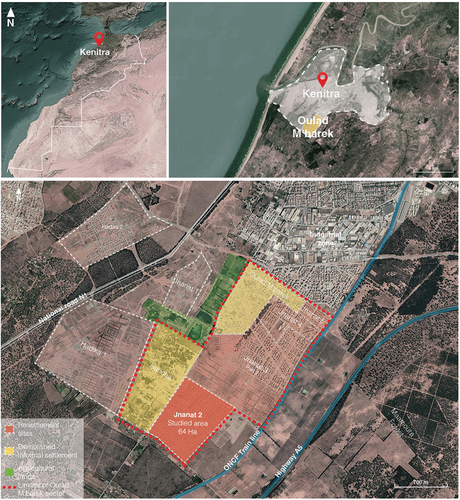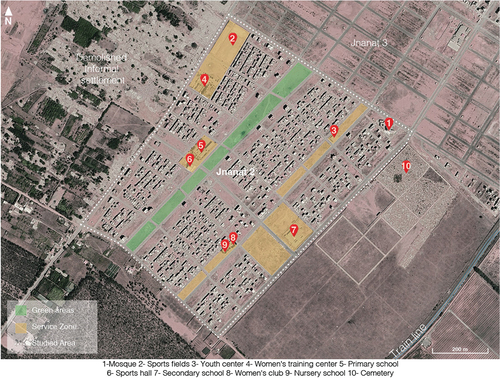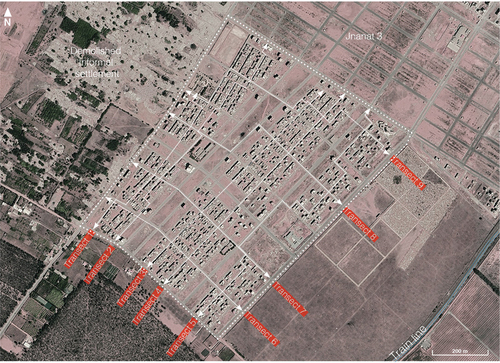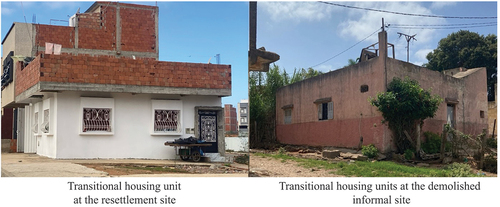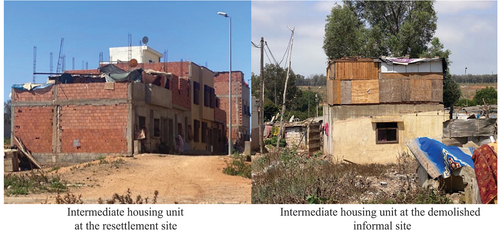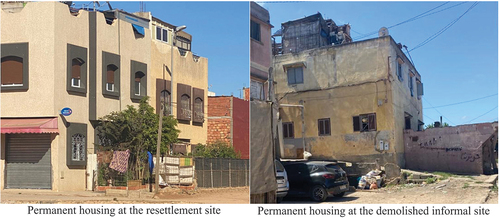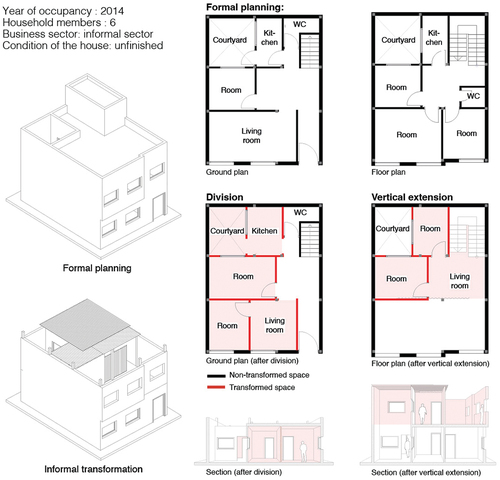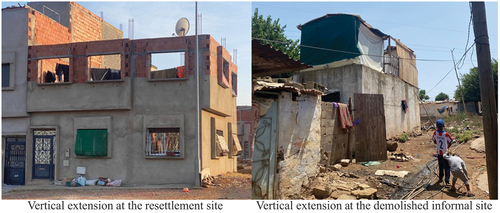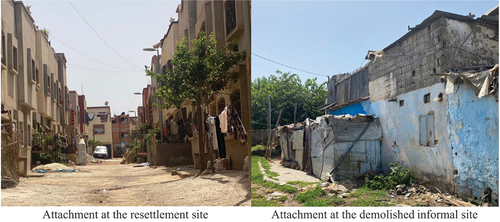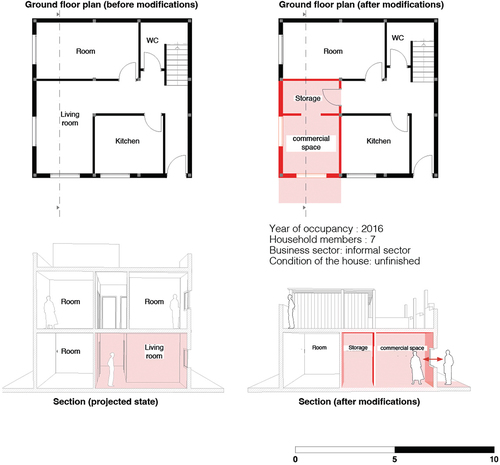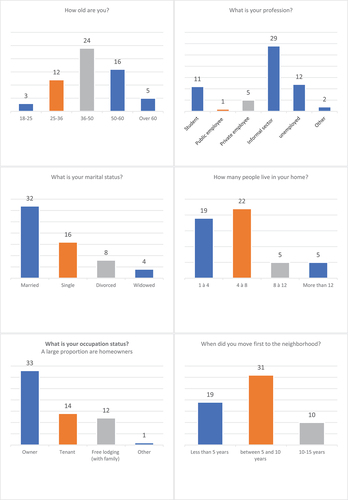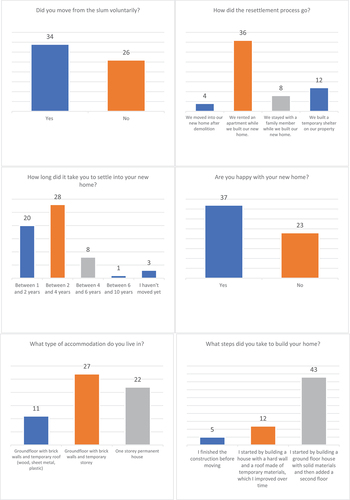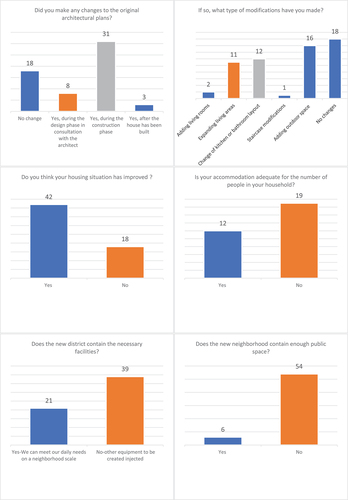ABSTRACT
Resettlement programs, integral to the ‘Villes Sans Bidonvilles’ (Cities without Slums) initiative, aim to rehouse populations from informal settlements to serviced allotments. Despite the advocacy for harmonious urban development, they often fail to prevent informal housing production, leading to a process of re-informalization. Against this backdrop, this research explores housing evolution during the re-informalization process, investigating mechanisms driving housing adaptation on resettlement sites and exploring how identified adaptation mechanisms relate to the dynamic adaptations shaping informal settlements. Based on a case study on the Oulad M’barek site in Kenitra, Morocco, the research utilizes various data collection methods, including transect walks, focus groups, surveys, and measurements, with thematic analysis as the primary analysis method. The results highlight parallels between re-informalization processes in resettlement sites and adaptive processes in informal settlements. These similarities manifest through housing form heterogeneity, enabling residents to customize dwellings based on needs and financial capacities, incremental transformation providing flexibility in time and investment, and functional mix underlining the interconnection between housing and residents’ livelihoods. The findings highlight the complementarity of formal and informal dynamics in addressing informal settlements, highlighting the need for flexible policy frameworks that leverage informal processes while preserving formal regulatory principles.
Introduction
According to UN-Habitat, the number of slum dwellers is on the rise. It is estimated that more than one billion people still live in slums (UN-Habitat, Citation2021). Given the challenges posed by this phenomenon, various programs have been implemented in several countries. The aim of these initiatives being to eliminate visible forms of informality, giving rise to slum-free cities, which align with neoliberal visions of competitive, modern, and developed cities (Dovey & King, Citation2011a; Ghertner, Citation2012; Huchzermeyer, Citation2011). Such neoliberal strategies rely on titling, privatization, and limited public sector involvement (Malpezzi & Mayo, Citation1997; Wakely & Riley, Citation2011b; World Bank, Citation1993).
The Villes Sans Bidonvilles ((VSB) Cities without Slums) program, launched in Morocco in 2004, is a perfect illustration of this phenomenon. The program’s ambition was to eradicate slums and establish an urban order in line with international standards (Beier, Citation2021; Bogaert, Citation2018; Harroud, Citation2019). This program was established around market-based governance systems focused primarily on access to property (Bogaert, Citation2018). It proposed multiple approaches to slum clearance, including rehousing, resettlement, and restructuring (UN-Habitat, Citation2020).
Despite the diversity of the proposed approaches, resettlement was the most widely advocated. Resettlement accounted for almost 80% of interventions, to the detriment of the other two methods, deemed more complex and less desirable by targeted communities (UN-Habitat, Citation2011). From the point of view of public actors, resettlement was often favored for its practicality and low financial cost compared with other types of intervention (Atia, Citation2022; UN-Habitat, Citation2011).
This study aims to shed light on the complex dynamics involved in dealing with informal settlements through resettlement programs. This research features the results of a case study carried out in the Oulad M’barek resettlement site in Kénitra. It complements an earlier study carried out in the informal settlement area, from which the beneficiaries of the resettlement program originate (prior to its demolition). In summary, this study aims to address the following research questions:
How are housing units evolving on resettlement sites?
What mechanisms underlie the adaptation of housing on these sites?
What are the connections between housing adaptation in formal and informal contexts?
How can these mechanisms help improve housing production processes?
The following section provides a literature review, establishing the background to this study. It examines the adaptive dynamics shaping the evolution of informal settlements and explores the origins and development of resettlement programs, both internationally and in the specific Moroccan context.
Literature review
Adaptive processes shaping the evolution of informal settlements
Informal settlements are urban environments that operate outside the regulatory state framework (UN-Habitat, Citation2018). These settlements are places of everyday city-making practices that play a key role in the dynamics of development in urban areas, particularly in developing countries (Dovey, Citation2012; Roy & AlSayyad, Citation2004).
While at first glance informal settlements may seem marginalized and disorganized (Perlman, Citation1976), a closer assessment of their situation reveals that they can exhibit a high degree of adaptation and resilience (Jones0F, Citation2017).
Living and livelihood
Informal settlements are at the heart of the urban landscape, they reflect a way of life that challenges prevailing notions of marginalization. Despite their resource constraints, these settlements demonstrate an exceptional capacity for managing harsh socio-economic conditions and coping with the risk of eviction (Dovey & King, Citation2011b; Perlman, Citation1976; Roy & AlSayyad, Citation2004).
Informal settlements constitute dynamic living and livelihood environments (Roy & AlSayyad, Citation2004). These neighborhoods provide essential housing for low-income earners when the formal sector is unable to meet their requirements (Suhartini & Jones, Citation2020). Moreover, they operate as production hubs, entertainment centers, and financial institutions (Kellett & Tipple, Citation2000; Laquian, Citation1983), generating the necessary resources for subsistence (Geyer, Citation2022).
Housing in informal settlements goes beyond its traditional role as a simple residential space; it also acts as a livelihood space, integrating activities such as small shops and local manufacturing workshops (Kellett & Tipple, Citation2000).
These mixes of uses contribute underlines the resilience and adaptability inherent in informal housing, highlighting its potential not only as a housing solution but also as a dynamic contributor to the economic and social fabric of urban communities.
Order and rules in informal settlements
Informal settlements, often characterized by their apparent disorder, reflect an underlying logic that governs their emergence and development (Dovey & King, Citation2011b). These settlements operate on an implicit order defined by flexible rules and patterns that are difficult to discern (Arefi, Citation2011). These rules, emanating from the speculative strategic actions of residents, dictate the emerging order within these neighborhoods (Dovey & King, Citation2011a).
Suhartini’s classification of rule types within informal settlements sheds light on the socially acceptable activities, tasks, and principles that shape their implicit order. A distinct pair of rules can be identified: ‘defined’ rules and ‘understood’ rules (Suhartini & Jones, Citation2020). Defined rules are explicit, conveying acceptable behaviors, while understood rules are implicit and potentially ambiguous, manifesting through residents’ physical actions in adapting their dwellings (Suhartini & Jones, Citation2020).
The intricate interplay between rules and order, as shaped by the strategic actions of residents, emerges to create and protect public and private spaces, encompassing rights of way, open spaces, daylight, views, and privacy (Hakim, Citation2016; Kamalipour & Dovey, Citation2020).
Morphologies and incremental adaptations
The morphology of informal settlements evolves and adapts over time through generative processes that are responsive to household needs (Dovey, Citation2019; Kamalipour, Citation2016a, Citation2016b; Rapoport, Citation1988). These processes, focus on the necessary ‘actions’ rather than fixating on the ‘end-results’ depicted in detailed drawings (Suhartini & Jones, Citation2020) allowing the residents to adapt and transform their living environment over time.
The process of transformation is fundamentally incremental, driven by residents through small scale non-linear geometric forms, diverse materiality, and a range of construction methods (Jones, Citation2019, Citation2022). To unpack the incremental transformations occurring in informal settlements, a set of typologies was established, including extension or addition, attachment, replacement, division, infill, and connection (Kamalipour & Dovey, Citation2020). According to (Kamalipour & Dovey, Citation2020) extension involves creating additional private space, attachment adds semi-private space, replacement upgrades construction quality, division splits interior space, infill encloses existing structures, and connection integrates services like water and electricity into dwellings.
Moreover, the incremental process is strongly linked to building materials (Ward & Smith, Citation2015). Material selection, based on lifespan and speed of change, ranges from makeshift materials for short-term needs to more durable options for long-term use (Buraglia Duarte, Citation2009). The construction methods in these contexts foster community participation and sustainability through the recycling of locally sourced materials, thereby reducing costs and promoting resource conservation (Wekesa et al., Citation2011).
The adaptability and heterogeneity of housing forms and construction methods in informal settlements enable residents to customize their living spaces according to their needs and financial capabilities, offering them flexibility in terms of time and investment (Suhartini & Jones, Citation2020).
Resettlement: origins and evolution
In the mid-twentieth century, housing policies aimed at tackling the phenomenon of informal settlements underwent a significant international shift. Until then, the prevailing notion had been to consider housing as a finished product to be provided by the state to the citizen, through social or public housing (Burgess, Citation1978; Cirolia et al., Citation2017; Huchzermeyer & Karam, Citation2006), thereby ignoring the importance of the inhabitants’ capacity for agency and self-determination (Buckley et al., Citation2016; Burgess, Citation1978; Keivani & Werna, Citation2001; Kowaltowski et al., Citation2019).
However, a significant shift was initiated by a growing interest in spontaneous and informal housing. In particular, John Turner’s studies in the Peruvian barriadas played a key role in highlighting the advantages of self-building, incremental housing development, and mutual aid in meeting the challenges of housing in resource-constrained contexts (J. Turner, Citation1968; J. F. C. Turner & Fichter, Citation1972). Their seminal statement calls for a nuanced approach that integrates the autonomous, incremental evolution of housing, typical of informal settlements, with external support. This external support is essential to fulfill the basic components that are beyond the means of the inhabitants of informal settlements, including land, infrastructure, and services (Wakely & Riley, Citation2011b).
This key change has led to the redefinition of housing as a process in which dwellers have the freedom to produce their living environment, adapting it to their needs and constraints (Mangin, Citation1967; J. Turner, Citation1968; J. F. C. Turner & Fichter, Citation1972). This approach also repositioned the role of architects, who are expected to be seen less as professionals in charge of the design and construction process, but rather as advisors at the service of inhabitants (Van Ballegooijen & Rocco, Citation2013).
Mainly influenced by the ideas of John Turner, the 1970s saw the worldwide adoption of the self-help model as a process for delivering affordable housing in the form of ‘Sites and Services’ projects (Peattie, Citation1982; Wakely & Riley, Citation2011a; World Bank, Citation1974). These programs involved the provision of plots of land with basic infrastructure for households. The latter are then expected to build their own homes, at their own pace (Wekesa et al., Citation2011);
This approach has fundamentally transformed the role of public sector authorities, shifting from housing provider to mediator (Testi, Citation2023), allowing communities to shape their living environment autonomously. The focus shifted from perceiving housing as a finite, delivered product to conceptualizing it as a dynamic entity, amenable to development, expansion, and adaptation by its inhabitants.
Morocco, meanwhile, began experimenting with the principle of self-build housing in the 1970s (Pinson, Citation1992). Up until then, the state had been the main provider of housing through large-scale social housing operations. These were modernist-influenced, granting people from the informal sector finished housing, as in the Hay Hassani project in Casablanca (Mocci, Citation2014; Palacios Labrador & Alonso Romero, Citation2021).
Nevertheless, certain projects at the time, such as Derb Jdid in Casablanca, were devised to offer the possibility of self-build vertical extension of the dwelling, enabling residents to develop the accommodation according to their evolving needs (Azagury, Citation1960). Nevertheless, self-building was not a housing model explicitly recognized by the state (Pinson, Citation1992).
Following an in-depth analysis of the social, economic, and cultural realities of informal settlements, from 1970 onwards, programs such as the one operated in Yaakoub El Mansour in Rabat gradually adapted similar programs to the sites-and-services approach. Such programs provided basic infrastructure in the form of allotments and allowed beneficiaries to self-manage the construction process. The layout of the housing was guided by a prototype plan that incorporated the idea of incremental construction. The blueprints included a plan for a basic unit, with the extension phases prescribed on the document provided to the resident (Pinson, Citation1992).
The prescribed standard plans initially intended to introduce temporal flexibility into the evolution of housing structures, underwent extensive modifications during the construction process, including changes to interior spaces and alterations to facades (ibid). Adaptations resulted from the unsuitability of the standard plans prescribed by the authorities for the diverse housing modes of the local population (ibid).
Although the idea of an incremental housing design represented a radical departure from the intervention programs of the time, it was gradually abandoned due to the monotony and repetitiveness of the prescribed blueprints, which were rarely adhered to (Navez-Bouchanine, Citation1994). Due to the limited accuracy of standard plans, later housing programs assigned architects the responsibility of formulating plans in collaboration with the beneficiaries (Pinson, Citation1992).
In Morocco, a half-century after the first attempts to deal with informal settlements through self-building, this approach is still persistent. Currently, self-building is primarily operated within resettlement programs carried out under the national program Villes Sans Bidonvilles ((VSB) Cities without Slums) (Atia, Citation2022; Martin & Mathema, Citation2008). Similar to sites-and-services schemes, resettlement involves relocating people living in informal settlements to serviced allotments. Displaced populations are given plots of land at a preferential price (UN-Habitat, Citation2020). The organization of resettlement sites is governed by a fixed allotment plan and a set of technical studies. , shows an example of an allotment plan of the studied area.
These measures are strategically formulated to promote the harmonious development of urban landscapes (MATNUHPV, Citation2023). Together with the allottees, the architect assumes the responsibility of formulating plans that reconcile the customer’s wishes with regulatory frameworks (Le Tellier & Isabelle, Citation2009). Unlike incremental plans, which allowed successive phases of evolution, in the case of resettlement, the housing units are envisioned as finished products.
Despite the many benefits it offers, the resettlement scheme has encountered significant challenges. Frequently, vulnerable populations who were able to afford a vacant lot were unable to finance the construction of their home, resulting in a landscape of unfinished structures on resettlement sites (Le Tellier, Citation2009). Indeed, faced with these funding limitations, residents of resettlement sites engaged in ‘re-informalization process’ (Beier, Citation2021; Dovey & Recio, Citation2023; Erman, Citation2016; Koster & Nuijten, Citation2012). These refer to all activities that escape the rules and regulations of the established system (Erman, Citation2016).
Although the sites-and-services approach (and similar approaches) consists in setting up a system for producing affordable housing for people living in the informal sector, which enables the development of housing to be adapted to the specific needs of the beneficiaries, the links between informality and adaptation in this type of project have received little attention.
To address this issue, this article aims to study the evolution of housing units on resettlement sites through a case study of the Oulad M’barek site in Kenitra, as part of the Villes Sans Bidonvilles ((VSB) Cities without Slums) program. It seeks to unravel the interplay between formal and informal practices at the housing scale, during re-informalization processes. In summary, this study will attempt to address the following research questions:
How are housing units evolving on resettlement sites?
What mechanisms underlie the adaptation of housing on these sites?
What are the connections between housing adaptation in formal and informal contexts?
How can these mechanisms help improve housing production processes?
The following sections include an overview of the (1) research context, (2) details on research design, research methodology, and data analysis methods, (3) presentation of investigation results, and an in-depth (4) discussion of those findings.
Research context
The Oulad M’barek sector is located on the southern fringe of the city of Kenitra in Morocco (see ). Covering an area of 380 ha, it was previously the site of two informal settlements: Douar Oulad M’barek to the northeast (50 ha) and Douar El Hancha to the southwest (80 ha).
According to Holding D’amenagement Al Omrane (Citation2006) Up until the 1990s, the Oulad M’barek sector was an agricultural zone characterized by a rural lifestyle. However, following its integration into the urban perimeter of the city of Kenitra in 1992, it became progressively denser and saw the emergence of informal housing units. This phenomenon was encouraged by informal land speculation and the attractiveness of prices for people from the rural exodus (Holding D’amenagement Al Omrane, Citation2006).
As illustrated in , in line with the Cities Without Slums (VSB) program initiated in 2010, the two informal settlements have undergone a gradual demolition process, culminating in the complete removal of all structures by March 2023. In addition, since 2010, a number of resettlement sites have been progressively developed to accommodate populations evicted from the same informal settlements. These sites are Jnanat 2, Jnanat 3, Jnanat 4 and Jnanat 5. The land formerly occupied by the informal settlement of Oulad M’barek (north-east) will be redeveloped into a housing estate (Quartier Zaitoune 1). The land formerly occupied by the informal settlement of El Hancha has not yet been part of any development program.
Figure 3. Evolution of the informal settlements and resettlement sites between 2008 and 2023. Source: map Data@2023 Google (adapted by the author).
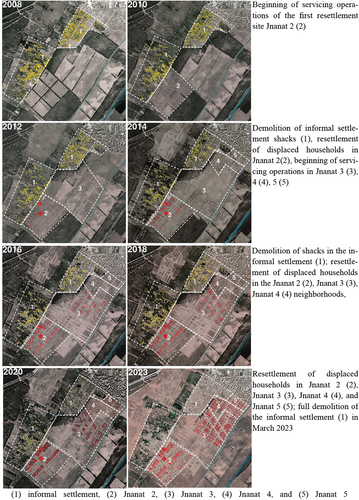
During this study, Jnanat 2 was selected as the study area (see ). This choice was motivated by the fact that Jnanat 2 is the oldest resettlement site in the resettlement program. In fact, the servicing of this district began in 2010, and the first households moved in from 2012 onwards.
The Jnanat 2 neighborhood also features a wide variety of housing units, which have undergone evolutionary trajectories specific to the context of the households. This offers valuable insights into the development potential of the housing units, with the potential to transpose these findings to other newly-created sites.
The district in question is located on the southern fringe of the Oulad M’barek sector and covers a total area of 64 hectares. According to the subdivision plan, there are three vocations: a housing zone, which is the largest, a green space zone, and an equipment zone. The district, as shown in , is equipped with primary and secondary education facilities, including a nursery, an elementary school, and a middle school. There is also a youth center, a women’s training center, and sports facilities.
Materials and methods
The case study research design was adopted as an empirical investigation methodology for understanding a situation in real real-life context (Yin, Citation1994). This approach aligns with our research, as it offers valuable insights into a context-specific understanding of organizational reality (Creswell & Creswell, Citation2017). It enables researchers to explore and understand the meanings that individuals or groups attribute to social or human issues (ibid). Conducting a case study requires the collection of a substantial amount of data from multiple sources to derive valid results (Hollweck, Citation2016; Marczyk et al., Citation2010; Yin, Citation1994). The following paragraph provides an overview of the data collection methods employed during the study of the Jnanat 2 neighborhood.
Transects walk
Transect walks in the Jnanat 2 neighborhood offered insights into the site’s current status and diverse adaptation strategies. This participatory research method, involving both residents and professionals (Mahiri, Citation1998), facilitated the gathering of on-site qualitative data to describe practices and explore diversity (Diedrich et al., Citation2014). To prepare, four key resource persons were identified based on historical knowledge of the neighborhood, availability, and willingness to participate. Together with the key persons, accessible and safe walking itineraries were established, focusing on the highly built-up areas of Jnanat 2, as shown in . The walks were scheduled over six months at different times to capture different temporalities. The walks were conducted slowly by small groups (two or three people). Observation and photography were used to collect visual information depicting actual situations, spatial configurations, and activities. Immediate transcription of detailed notes enabled us to record details accurately and capture all pertinent information.
Focus groups
A total of 17 participants (11 men, and 6 women) took part in semi-structured interviews organized into five focus groups, each lasting between 40 and 60 minutes. Selection criteria included being a tenant, being involved in the VSB program, and having in-depth knowledge of the neighborhood and its history before the demolition of informal settlements.
A mix of open-ended questions, organized by theme, and exchanges of opinions between participants and the research team enabled an in-depth exploration of difficulties encountered during the rehousing period, strategies for adapting to new housing conditions, and perceptions of the resettlement operation’s principles. The focus group format was a valuable tool for revealing the complex motivations (McLafferty, Citation2004) underlying the adaptation process. The conversations were recorded with the consent of the participants. They were conducted in Darija Arabic (local dialect), transcribed verbatim, and translated into English. Pseudonyms were assigned to each interview to preserve the anonymity of the participants, including those quoted in this article.
Surveys
To get a better idea of the actual housing situation, 60 structured surveys were carried out on a random sample of households, gathering data on demographics, occupancy status, residence duration, conditions of installation on the resettlement site, condition of the dwelling, and adaptation measures. Each interview was coded to ensure anonymity, and the surveys were conducted in Darija Arabic (the local dialect) before being translated into English. The results of the questionnaire can be found in the Appendix.
Architectural measurement
Architectural measurements were conducted to depict the evolution of housing units and their adaptation over time at a spatial scale. Selection criteria for the three chosen dwellings included their potential to offer nuanced insights into adaptation strategies, the diversity of architectural responses, and the residents’ willingness to participate in the study. While participants permitted us to visit their homes, they declined photography and recording of conversations to preserve privacy. These constraints did not hinder us from capturing spatial elements effectively. The collected data primarily consisted of visual information, utilizing detailed plans, sections, elevations, and sketches to document diverse aspects of adaptations at a spatial scale. Comprehensive notes were taken to ensure accurate recording of details.
Data analysis
Following the field investigations, a thematic analysis was carried out by the research team to discern patterns and themes within the collected data (Alhojailan, Citation2012), with a focus on housing adaptation in the Jnanat 2 neighborhood. Following Braun and Clarke’s (Citation2006) six-phase framework, our analytical approach began with (i) data familiarization. The team carefully examined interviews, transcripts, notes, and visual documents to identify recurring patterns. In the next phase, (ii) initial codes were created through descriptive coding, involving annotation of relevant data segments and interpretation within clusters aligned with our research questions. Next, (iii) the list of codes was finetuned through team discussions to reveal potential intersections, leading to the identification of themes and sub-themes. (iv) Themes and subthemes were critically reviewed, defined, and named. (v) Final themes and sub-themes were carefully defined and named during discussions between the authors. To enhance the validity of the results, we incorporated ‘member checking’ (Creswell & Miller, Citation2000), enabling participants to cross-check and validate results. Finally, (vi) a detailed report, supported by fieldwork quotes, photographs, and drawings, was produced.
Results
This study investigates housing unit evolution in the Jnanat 2 resettlement site in Kénitra, Morocco, with a focus on identifying adaptation mechanisms. In this section, we present the results of the analysis. The case study identified three adaptation mechanisms at housing unit level: (i) housing form heterogeneity, (ii) incremental transformations, and (iii) functional mix. illustrates the developed thematic map, presenting the three main adaptation mechanisms identified during the fieldwork, and their related sub-themes.
Figure 6. Thematic map presenting the three adaptation mechanisms (housing form heterogeneity, incremental transformation, and functional mix) and the related sub-themes.
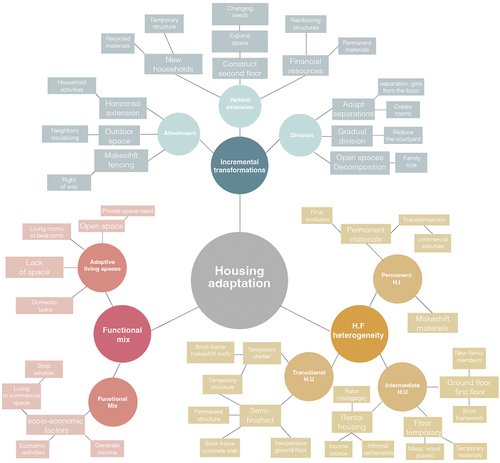
During this presentation, it will be demonstrated that, for each form of adaptation, various similarities were observed during prior research conducted in the original informal settlement before its demolition in 2023.
Housing form heterogeneity
In the allotment plan, each plot is assigned a use defined by several criteria such as size, number of stories, and land use, giving the neighborhood an organized, uniform structure.
However, although there are precise regulatory measures aimed at achieving a uniform result, the reality on the ground reflects a multiple diversity of forms, which are the result of different self-managed construction methods.
For the heterogeneity of housing form and during field investigations three distinct housing typologies were highlighted, according to the criteria of housing layout (one or multiple floors) and durability of building materials.
Three types of units were identified: (a) transitional housing units, (b) intermediate housing units, and (c) permanent housing units.
Transitional housing units
Survey quote (Ali): with the limited means at my disposal and given that the price of the lot dried up all my savings, I was able to build, thanks to a neighbor who is a mason, the ground floor without a slab. Next year, in challah, I’m going to pave over two bedrooms and the kitchen, and then after that, we’ll see maybe, I’ll finish the whole thing in four or five years.
Our research has identified an initial phase common to the majority of housing units. In this phase, the housing unit typically consists of a ground floor in a permanent or temporary structure, establishing an initial anchor point in the neighborhood.
It corresponds to a primary, transitional phase of housing, generally in the form of a temporary shelter.
Surveys carried out on the site revealed that residents who do not have the necessary funds start building a semi-finished, relatively inexpensive ground floor, which is then improved over time by adding elements such as carpentry, floor coverings, etc.
Therefore, on the resettlement site, there are two types of transitional housing units:
Brick-framed units with roofs made from recycled materials. The carpentry is also made from recycled materials available on active sales circuits, often from the recycling of the demolished shantytown.
These units are similar to the temporary shelters found in the Ouled M’barek settlement before its demolition, as shown in .
Figure 7. Photos of transitional housing units: brick structure with a roof made from recycled materials (photographs by author).
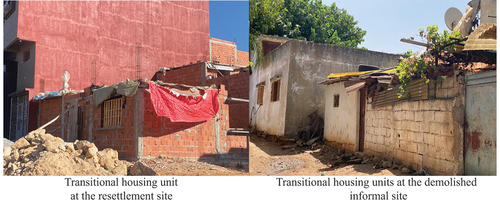
The units are made of a brick frame and concrete slab. The joinery is made of recycled wood or aluminum.
In the same way, the principle of adaptation can be found in this transitional phase of housing construction on the resettlement site and was already observed on the Ouled M’barek site before its demolition (see ).
Intermediate housing units
During this phase, the housing unit generally comprises a ground floor and a first floor, making it possible to accommodate compound households or multiple other households (rental, mortgage, etc.).
This phase is characterized by the addition of another story, initially using temporary materials. The added story generally consists of a brick framework covered with temporary materials, such as sheet metal, wood, and plastic for waterproofing.
The motivations behind these transformations are manifold. For example, the high demand for rental housing following demolition operations has prompted many households to add an extra story to their dwelling. This extra space can be rented out, or used to accommodate a family member made homeless following the demolition operations in 2023.
In other cases, some households build a floor to accommodate a household under a contract similar to a ‘mortgage’, known as a ‘Rahn’. This involves housing a non-owner on the first floor for a mutually agreed period, who pays a substantial sum to be reimbursed by the owner at the end of the lease, in addition to a symbolic monthly rent to be paid by the contracting party. This avoids the need for the owner to take out new loans to continue the construction process.
The added upper part is often built using materials recovered from informal settlements before they are demolished, such as wood, plastic, and sheet metal. During the period of a rental or a mortgage with rental, the upper floor is progressively improved thanks to the income generated by these ‘rental/mortgage’ arrangements.
Once again, this form of housing evokes the adaptability practices already encountered in Ouled M’barek’s informal settlements before their demolition, as illustrated in . They symbolize a transitional solution that provides households with additional living space. This additional space can be used to accommodate new family members or to provide a source of income through rental.
Permanent housing unit
This typology represents the final stage of the housing unit’s evolution within the resettlement sites, corresponding to a permanent dwelling. During this phase, the housing unit is expected to conform to the building plans.
However, our investigations revealed the existence of numerous transformations carried out over several stages.
For example, transformations to a house’s informal commercial activities, observed on the first floor, are maintained over time, becoming a permanent feature of the dwelling.
In addition, and in the same way as the other typologies described above, it is observed that the same pattern of housing evolution (characterized by slow, gradual construction) identified in the Ouled M’barek neighborhood site before its demolition has been replicated in the resettlement site (see ).
Incremental transformations
Resettlement sites present an interesting context for observing the dynamics of housing construction and housing adaptation, particularly in terms of incremental transformations. Unlike the organic growth often observed in informal housing, resettlement areas are subject to standard architectural plans that strongly influence their final form.
Of course, standard plans aim to:
Guarantee uniformity and compliance with specific guidelines for the design of housing space;
Cover various aspects, including the external appearance of housing units, such as the height and composition of facades, as well as the location of the front door;
However, despite this regulatory framework, housing units are modified according to the pace and conditions of construction financing.
Our field investigations revealed three types of incremental transformation in the resettlement sites studied: division, vertical extension, and attachment.
Division
Survey quote: (Mohammed) At first, I was very happy to have an architectural plan and assistance offered by the commune and Al Omrane. I didn’t understand anything about the plan and started building the partitions gradually (chouia-chouia) without really waiting for the architect’s advice, because according to the mason to whom I entrusted the construction, the partitions shown on the plan didn’t suit me at all. I had to adapt these separations to the size of my family and the need to separate the girls from the boys. As long as I respected the exterior design, the facades, and, above all, the concrete reinforcement plan, the commune authorities were not concerned .
The division process involves the fragmentation of open spaces within housing units to create additional private space. In the context of resettlement sites, households that do not have sufficient resources to partition off interior spaces generally occupy non-partitioned units at first. As their needs evolve or their financial capabilities improve, they gradually divide these open spaces to create separate rooms.
Division is the most common transformation observed on resettlement sites. In informal settlements, division is often organic and unplanned, with residents adapting their living spaces to their immediate needs. On resettlement sites, however, division is a more structured process, aligned with the layout specified in the architectural plans.
However, households can adapt the distribution of interior spaces provided for in the architectural plans and modify the size and distribution of interior spaces in the resettlement sites.
Household surveys revealed several scenarios in which living space could be adjusted. For example, some households chose to reduce the size of the courtyard and devote the freed-up space to enlarging the living areas (see Division in ).
Vertical extension
Survey quote: (Ahmed) Luckily, we were allowed to build a second floor. It gave us a lot of rental income, which will help us finish the construction. I have the possibility of rearranging the separations so as to have two apartments upstairs, I’m still thinking about i
Vertical extension involves progressive transformation strategies on resettlement sites, enabling households to expand their living spaces by adding new floors.
The process usually begins with a temporary structure built using recycled materials from the former informal settlement (see vertical extension in ).
These first extensions in height mark the start of an evolutionary cycle that culminates in reinforced structures using permanent materials intended for a specific end use (rental, housing a son, etc.).
The vertical extensions observed in the resettlement sites, as shown in , bear many similarities to those observed in the informal settlements prior to their demolition. In both cases, housing units are gradually extended to accommodate a growing number of households.
The use of recycled materials in the initial stages of horizontal extensions is common practice in both contexts. This approach enables households to initiate the transformation process using available financial resources, while adapting to their changing individual needs.
In some cases, households may go beyond the limits of the upper floor to generate new covered areas within the dwelling, either by raising the construction above the permitted height or by encroaching on public rights-of-way.
In many cases, the granted surface area (63 m2 per household) in the resettlement allotments is not enough, and appears very limited compared to the living surface area available in the informal settlement.
Attachment
Survey quote (Rachid): Outside or in front of my house, it’s up to me to decide what to do with it. As long as I don’t block the passage of vehicles. Occupying a few meters of the public highway doesn’t bother anyone, and in fact, everyone does the same thing. The inside of the house isn’t big enough and this outside space is a plus for us.
Attachment is a form of horizontal extension on resettlement sites, tending to appropriate the public outdoor space adjacent to the dwelling. These spaces are generally uncovered, but fenced in with precarious salvaged materials.
The established outdoor spaces serve diverse purposes. They serve as gathering places for compound households, and for socializing with neighbors without access to the interior of the dwelling. These additional spaces can be used for household activities such as drying, cooking, etc., or can be laid out as vegetable gardens, or parking spaces for motorcycles, handcarts, or vehicles (see attachment at the resettlement site, ).
Although informal, attachment is still widespread on the resettlement sites. Residents of resettlement sites often attach great value to the outdoor spaces of the dwelling because of their long-standing practices of constantly occupying open space on informal settlements for a variety of reasons.
Functional mix
The concept of functional mix refers to the multiplicity of uses present in housing units and in the neighborhood in general. This notion stems from the need for adaptability and multi-functionality, particularly in environments where space is limited and resources scarce.
One of the main manifestations of functional mix in resettlement sites is the adaptive use of living spaces. This need arises from an interaction between socio-economic factors and constraints linked to the lack of space within the dwelling, necessitating modifications to the initial use of space.
For example, living rooms in some housing units are commonly converted into bedrooms, reflecting the need for more private space, especially for large families. Some units may not be divided into rooms for specific functions. Instead, the space remains open, making it easier to perform a variety of domestic tasks.
This type of spatial organization can also be observed in informal settings, where the absence of fixed spaces gives rise to polyvalent spaces that host a variety of activities according to occasional needs.
The integration of economic activities into the domestic space is another manifestation of the functional mix in the resettlement site.
In order to generate the income needed to continue building the dwelling, some housing units set up spaces on the ground floor dedicated to economic activities. These activities can take various forms, such as the sale or storage of goods, workshops, etc. These spaces generally result from the transformation of a living area into a commercial space, with an extension into the public space. The commercial space, as depicted in , takes the form of a shop window, enabling the display of various sales products.
These transformations are often carried out informally, as they are not provided for in urban planning documents or architectural plans. This common practice, observed in informal settlements, is also found on resettlement sites, where housing-related socio-economic activities predominate.
Discussion
The following section discusses the results obtained from a case study carried out at the Oulad M’barek resettlement site in Kénitra. It aims to (i) compare and (ii) interpret the adaptation processes highlighted in the case study with those inherent to informal settlements in a broader context. The comparative analysis is intended to reveal practical implications, particularly concerning the role of planning professionals in the context of resettlement programs.
The application of resettlement programs in the Moroccan context involves the attribution of serviced lots, adapted to the financial capacities of households with limited resources. At the same time, it ensures the harmonious growth of the neighborhoods, guided by detailed plans and technical urban development studies.
Nevertheless, the case study of the Ouled M’Barek resettlement site in Kénitra unfolds a nuanced narrative, revealing a distinctive interplay between formality and informality during housing units’ evolution. In this instance, residents have engaged in processes of re-formalization, resulting in the emergence of new informal practices in a formally regulated context.
Comparison of adaptation process within informal settlements and resettlement site
The paper argues that the re-informalization processes observed in resettlement sites share significant similarities with the adaptive processes shaping the evolution of Informal Settlements. These similarities can be captured through the housing form heterogeneity, incremental transformation, and the functional mix.
Housing form heterogeneity
Informal settlements and resettlement sites share a common heterogeneity of housing form. Housing in Informal settlements is marked by a variety of small-scale, non-linear geometric patterns, diverse materiality, and a wide choice of construction methods (Suhartini & Jones, Citation2020). These features empower residents to tailor their housing based on their requirements and financial capacities, providing flexibility in terms of both time and investment (Kamalipour, Citation2020; Kamalipour & Dovey, Citation2020).
Similarly, resettlement sites, initially designed with regular and standardized housing morphology, reflect heterogeneous forms as evidenced by transitional, intermediate, and permanent housing unit typologies.
Transitional housing units consist of a temporary ground floor constructed with a mix of makeshift and solid materials to address urgent housing needs and establish an initial anchor point in the neighborhood. Intermediate housing units, comprise a solid ground floor and a temporary first floor made with recycled materials, enabling the accommodation of compound households or multiple other households (through rental or mortgage arrangements). Permanent housing units take the form of robust two-story homes, incorporating permanent construction materials for enhanced stability, representing the final stage of housing unit evolution.
The evident heterogeneity in housing form and material diversity within resettlement sites reflects the dynamic socio-economic circumstances influencing inhabitants’ dwelling choices. Residents in resettlement sites progressively construct their dwellings based on financial constraints and evolving needs, showcasing an adaptive response to changing conditions.
Incremental transformation processes
Another significant parallel between informal settlements and resettlement sites lies in their incremental transformation processes. Indeed, in informal settlements, the transformation process is generally incremental (Kamalipour & Dovey, Citation2020; Ward & Smith, Citation2015). It is driven by strategic, speculative resident-led actions that prioritize necessary moves over a predetermined result (Dovey, Citation2012; Suhartini & Jones, Citation2020). This process contributes to the dynamic and responsive evolution observed in informal settlements.
In contrast, resettlement sites provide a distinct yet comparable narrative. Here, the fixed form dictated by planning documents is decomposed and adapted via incremental transformations. The identified incremental transformations within resettlement sites involve division, vertical extension, and attachment.
Division relates to the partitioning of open spaces within housing units, allowing residents to create separate rooms. Vertical extension refers to the expansion of housing units to accommodate a new floor. Attachment is a horizontal form of extension in which the public outdoor spaces adjacent to the housing units are appropriated by residents.
These incremental transformations collectively result in the emergence of a hybrid order, wherein the initially fixed formal rules outlined in planning documents are transformed into flexible ones, neither strictly formal nor informal. This flexible order allows residents the freedom to adapt and develop their dwellings through incremental steps.
Functional mix
The similarities between informal settlements and resettlement sites are further highlighted by the adaptive nature of space and functional mix. In informal settlements, spatial organization is highly adaptable, allowing space functions to be flexibly modified according to needs and reflecting a multiplicity of income-generating activities (Kellett & Tipple, Citation2000; Roy & AlSayyad, Citation2004).
Similarly, within resettlement sites, the initially planned spatial organization undergoes adjustments in response to the evolving needs of the residents. These adjustments encompass transformations from purely residential to income-generating spaces. For instance, living spaces might be transformed into areas for sales and services. This underscores the idea that homes in resettlement sites transcend their role as mere living spaces; instead, they are intricately linked to the livelihoods of the residents
Interpretation: formal and informal as legitimate methods of making the city
The findings from this study highlight that the introduction of a formal housing scheme is ineffective in ending the informal adaptation processes taking place. While informality is traditionally perceived as a transitional phase towards formality (Pojani, Citation2019), the empirical findings from this study suggest a blurry demarcation between the two.
In resettlement sites, the unplanned growth, not originally anticipated by planning documents, transforms what was initially conceived as a formal resettlement program into a support for a dynamic evolution of space. The double logic, inherent to this process, is characterized by the reciprocal relationship between informality, which tends to formalize, and formality, which simultaneously undergoes a process of informalization (Dovey & Recio, Citation2023). In the case study, this double logic is captured through the re-informalization process.
This study emphasizes that these mechanisms, far from being an anomaly, are adaptive responses to the limitations of formal planning. The fundamental claim of the findings, as elucidated by previous research (Hernández et al., Citation2022; Roy, Citation2012; Roy & AlSayyad, Citation2004), is that informality constitutes a permanent characteristic of the global urban landscape. Furthermore, planning practices and informal dynamics are not separate entities, but integral components of a unified system of relationships (AlSayyad, Citation2004; Hernández et al., Citation2022; Roy & AlSayyad, Citation2004). Consequently, formal and informal orders can be conceived as legitimate methods for ‘making the city’ (Landry, Citation2012). Consequently, these two approaches can be conceptualized as complementary methods in addressing the phenomenon of informal settlements.
Recommendations: toward flexible policy frameworks
Recognizing formal and informal orders as legitimate ways of shaping the city means a conceptual shift that poses critical challenges for built environment professionals’ ability to assist informal adaptation processes in urban environments.
The conventional planning approach often views form as static, in contrast to the dynamic and adaptive nature of informality (Pojani, Citation2019). This point of view can impede formally trained professionals from recognizing the legitimacy of the urban forms emerging from the re-formalization process in resettlement sites.
Regardless, planning professionals must acknowledge and accept the persistence of informal adaptation despite the imposition of regulatory frameworks. This acknowledgment necessitates a fundamental departure from entrenched notions of fixed and permanent formal outcomes.
This calls for policy frameworks that adopt a more flexible and adaptive approach, shifting from rigid codes to the nurturing of prospective guidelines that prioritize necessary actions rather than focusing on predetermined outcomes. Such a paradigm shift is essential to effectively embrace the makeshift and the temporary (Kamalipour & Dovey, Citation2020), thereby unleashing the productive capacities inherent in informal processes while preserving the regulatory and ordering logic of the formal order.
Limitations
The present study, while providing valuable insights into adaptation processes within a given resettlement context, is not without its limitations. It is essential to recognize these limitations to contextualize the results and orient future research endeavors.
Carried out within a context of increased social tensions during the demolition of the Oulad M’barek informal settlement (the neighborhood from which the target population originates), the research encountered difficulties linked to the willingness of residents to take part in surveys (60 people interviewed), focus groups (17 participants) and measurements (three houses studied), resulting in a limited sample size. This limitation raises concerns about the generalizability of findings beyond the specific context. To enhance generalizability, future research should incorporate additional case studies from various contexts.
Furthermore, the resettlement site under study comprised numerous unbuilt lots due to its recent creation. Although this condition did not prevent the assessment of housing evolution, it did limit the examination of morphological development at the neighborhood scale, particularly concerning public space, commons, and potential issues of overdevelopment. A deeper understanding of these aspects may require a follow-up study once all the housing units have been built.
Ethical considerations
This article, a section of a doctoral thesis, received ethical approval from the ‘Comité d’Accompagnement de Cotutelle’ (Cotutelle Support Committee), comprising members from the University of Mons and the Euromed University of Fez, before the data collection process. Before field data collection, a detailed explanation of the research objectives was provided to help participants make informed decisions about sharing their lived experiences, and oral consent was obtained from all the involved participants. To protect participants’ confidentiality, all names were anonymized. The participants voluntarily took part in the study, and no incentives were offered for participation.
Geolocation information
This study was carried out in the Jnanat 2 neighborhood in the city of Kénitra, Morocco.
Geographic coordinate values : 34°12’58.48“N 6°37’39.51”O
Acknowledgments
This article is part of a PhD thesis conducted in joint supervision between the University of Mons and Euromed University of Fes. We would like to express our sincere gratitude to the residents of Jnanat 2, especially Houssine, Mohammed and Amine, for their invaluable help throughout our research. Their support was instrumental in the success of this project. Furthermore, we would like to thank the “Délégation du Ministère de l’Habitat et de la Politique De La Ville, Kenitra” for providing us with valuable data. We extend our gratitude to the anonymous reviewers for their insightful comments.
Disclosure statement
No potential conflict of interest was reported by the author(s).
Data availability statement
The authors confirm that the data supporting the findings of this study are available within the article and its supplementary materials.
Additional information
Funding
References
- Alhojailan, M. I. (2012). Thematic analysis: A critical review of its process and evaluation. WEI International European Academic Conference Proceedings, Zagreb, Croatia.
- AlSayyad, N. (2004). Urban informality as a “new” way of life. Urban Informality: Transnational Perspectives from the Middle East, Latin America, and South Asia. Lexington Books, 7–32.
- Arefi, M. (2011). Order in informal settlements: A case study of Pinar, Istanbul. Built Environment, 37(1), 42–56. https://doi.org/10.2148/benv.37.1.42
- Atia, M. (2022). Refusing a “city without slums”: Moroccan slum dwellers’ nonmovements and the art of presence. Cities, 125, 102284. https://doi.org/10.1016/j.cities.2019.02.014
- Azagury, E. (1960). Le Derb Jdid (Hay Hassani) Casablanca. L’Architecture d’Aujourd’hui, 87, 53–57.
- Beier, R. (2021). From visible informality to splintered informalities: Reflections on the production of ‘formality’ in a Moroccan housing programme. International Journal of Urban and Regional Research, 45(6), 930–947. https://doi.org/10.1111/1468-2427.13001
- Bogaert, K. (2018). Globalized authoritarianism: Megaprojects, slums, and class relations in urban Morocco (Vol. 27). University of Minnesota Press.
- Braun, V., & Clarke, V. (2006). Using thematic analysis in psychology. Qualitative Research in Psychology, 3(2), 77. https://doi.org/10.1191/1478088706qp063oa
- Buckley, R. M., Kallergis, A., & Wainer, L. (2016). The emergence of large-scale housing programs: Beyond a public finance perspective. Habitat International, 54, 199–209. https://doi.org/10.1016/j.habitatint.2015.11.022
- Buraglia Duarte, P. G. (2009). Informal settlements: A neglected aspect of morphological analysis P.G. Buraglia Duarte. Urban Morphology, 13(2), 138–140. https://doi.org/10.51347/jum.v13i2.4519
- Burgess, R. (1978). Petty commodity housing or dweller control? A critique of John Turner’s views on housing policy. World Development, 6(9–10), 1105–1133. https://doi.org/10.1016/0305-750X(78)90067-0
- Cirolia, L. R., Görgens, T., van Donk, M., Smit, W., & Drimie, S. (2017). Upgrading informal settlements in South Africa: Pursuing a partnership-based approach. Juta and Company (Pty) Ltd.
- Creswell, J. W., & Creswell, J. D. (2017). Research design: Qualitative, quantitative, and mixed methods approaches. Sage publications.
- Creswell, J. W., & Miller, D. L. (2000). Determining validity in qualitative inquiry. Theory into Practice, 39(3), 124–130. https://doi.org/10.1207/s15430421tip3903_2
- Diedrich, L., Lee, G., & Braae, E. (2014). The transect as a method for mapping and narrating water. Humboldt’s Open Works and Transareal Travelling. https://search.proquest.com/openview/5568e0cffe4dcd6af12fbf1017518cd0/1?pq-origsite=gscholar&cbl=4476954&casa_token=wu7aXDQkKsgAAAAA:U7b5LfMpw9GWLwXZptFUGslKoexcUAPnU05pNJAWpx3fHzJuel0bWE59OI3bx9bvWUWfdW1h98em
- Dovey, K. (2012). Informal urbanism and complex adaptive assemblage. International Development Planning Review, 34(4), 349–368. https://doi.org/10.3828/idpr.2012.23
- Dovey K. (2019). Informal settlement as a mode of production. In T. Banerjee A., & Loukaitou-Sideris (Eds.), The new companion to urban design (pp. 139–151). Routledge.
- Dovey, K., & King, R. (2011a). Forms of informality: Morphology and visibility of informal settlements. Built Environment, 37(1), 11–29. https://doi.org/10.2148/benv.37.1.11
- Dovey, K., & King, R. (2011b). Forms of informality: Morphology and visibility of informal settlements. Built Environment, 37(1), 11–27. https://doi.org/10.2148/benv.37.1.11
- Dovey, K., & Recio, R. B. (2023). Harnessing settlement re-informalization: Morphogenesis of on-site upgrading at Sitio Pajo. Habitat International, 131, 102724. https://doi.org/10.1016/j.habitatint.2022.102724
- Erman, T. (2016). Formalization by the state, re-informalization by the people: A gecekondu transformation housing estate as site of multiple discrepancies. International Journal of Urban and Regional Research, 40(2), 425–440. https://doi.org/10.1111/1468-2427.12349
- Geyer, H. S. (2022). Can informality help create smart, sustainable cities? The vibrancy of self-organised informal settlements in Cape Town. GeoJournal, 88(3), 2471–2489. https://doi.org/10.1007/s10708-022-10758-6
- Ghertner, D. A. (2012). Nuisance talk and the propriety of property: Middle class discourses of a Slum-Free Delhi. Antipode, 44(4), 1161–1187. https://doi.org/10.1111/j.1467-8330.2011.00956.x
- Hakim, B. (2016). Mediterranean urbanism. Springer.
- Harroud, T. (2019). D’une marginalité à l’autre : droit à la ville et pratiques de réadaptation des « bidonvillois » dans les nouvelles marges urbaines de Rabat. Annales de géographie, N° 729-730(5), 14–37. https://doi.org/10.3917/ag.729.0014
- Hernández, F., Kellett, P., & Allen, L. K. (2022). Rethinking the informal city: Critical perspectives from Latin America. Berghahn Books.
- Holding D’amenagement Al Omrane. (2006). Etude D’impact Du Projet De Recasement Des Bidonvilles De Oulad M’barek Dans La Ville De Kenitra (tranche 2).
- Hollweck, T. (2016). Robert K. Yin. (2014). Case study research design and methods (5th ed.). Sage. https://doi.org/10.3138/CJPE.30.1.108
- Huchzermeyer, M. (2011). Cities with ’slums’ : From informal settlement eradication to a right to the city in Africa. UCT Press.
- Huchzermeyer, M., & Karam, A. (2006). Informal settlements: A perpetual challenge?. Juta and Company Ltd.
- Jones, P. (2019). The shaping of form and structure in informal settlements: A case study of order and rules in lebak siliwangi, Bandung, Indonesia. Journal of Regional & City Planning, 30(1), 43–61. https://doi.org/10.5614/jpwk.2019.30.1.4
- Jones, P. (2022). Understanding “free-form” micro-morphology in informal settlements. In Informality and the city (pp. 393–406). Springer International Publishing. https://doi.org/10.1007/978-3-030-99926-1_26
- Jones0F, P. (2017). Housing resilience and the informal city. Journal of Regional & City Planning, 28(2), 129–139. https://doi.org/10.5614/jrcp.2017.28.2.4
- Kamalipour, H. (2016a). FORMS of INFORMALITY and ADAPTATIONS in INFORMAL SETTLEMENTS. International Journal of Architectural Research Hesam Kamalipour Archnet-IJAR, 10(3), 60. https://doi.org/10.26687/archnet-ijar.v10i3.1094
- Kamalipour, H. (2016b). Urban morphologies in informal settlements. http://contour.epfl.ch/
- Kamalipour, H. (2020). Improvising places: The fluidity of space in informal settlements. Sustainability, 12(6), 2293. https://doi.org/10.3390/su12062293
- Kamalipour, H., & Dovey, K. (2020). Incremental production of urban space: A typology of informal design. Habitat International, 98, 98. https://doi.org/10.1016/j.habitatint.2020.102133
- Keivani, R., & Werna, E. (2001). Modes of housing provision in developing countries. Progress in Planning, 55(2), 65–118. https://doi.org/10.1016/S0305-9006(00)00022-2
- Kellett, P., & Tipple, A. G. (2000). The home as workplace: a study of income-generating activities within the domestic setting (Vol. 12, Issue 1).
- Koster, M., & Nuijten, M. (2012). From Preamble to Post-project Frustrations: The Shaping of a Slum Upgrading Project in Recife, Brazil. Antipode, 44(1), 175–196. https://doi.org/10.1111/j.1467-8330.2011.00894.x
- Kowaltowski, D. C. C. K., Muianga, E. A. D., Granja, A. D., Moreira, D. D. C., Bernardini, S. P., & Castro, M. R. (2019). A critical analysis of research of a mass-housing programme. Building Research & Information, 47(6), 716–733. https://doi.org/10.1080/09613218.2018.1458551
- Landry, C. (2012). The art of city making. Routledge.
- Laquian, A. A. (1983). Basic housing: Policies for urban sites, services, and shelter in developing countries. IDRC.
- Le Tellier, J. (2009). Accompagnement social, microcrédit logement et résorption des bidonvilles au Maroc. Les Cahiers d’EMAM, 17(17), 55–70. https://doi.org/10.4000/emam.248
- Le Tellier, J., & Isabelle, G. (2009). « Participation », accompagnement social et microcrédit logement pour la résorption des bidonvilles au Maroc. Revue d’Économie Régionale and Urbaine, 4(4), 657–682. https://doi.org/10.3917/reru.094.0657
- Mahiri, I. (1998). Comparing transect walks with experts and local people. 31, https://pubs.iied.org/sites/default/files/pdfs/migrate/G01744.pdf?
- Malpezzi, S., & Mayo, S. K. (1997). Getting housing incentives right: A case study of the effects of regulation, taxes, and subsidies on housing supply in Malaysia. Land Economics, 73(3), 372. https://doi.org/10.2307/3147174
- Mangin, W. (1967). Latin American Squatter settlements: A problem and a solution. Latin American Research Review, 2(3), 65–98. https://doi.org/10.1017/S002387910001534X
- Marczyk, G., DeMatteo, D., & Festinger, D. (2010). Essentials of Research Design and Methodology. https://books.google.com/books?hl=fr&lr=&id=IhLlSGyJwcwC&oi=fnd&pg=PA1&dq=Marczyk,+G.,+DeMatteo,+D.,+%26+Festinger,+D.+(2005).+Essentials+of+Research+Design+and+Methodology&ots=_T4zRScwa8&sig=MBUCeW6aCBJ-ADta_JKBu_xM3VQ
- Martin, R. J., & Mathema, A. S. (2008). Housing finance for the poor in Morocco: Programs, policies and institutions. USAID.
- MATNUHPV. (2023). LE PROGRAMME NATIONAL « VILLES SANS BIDONVILLES », https://www.mhpv.gov.ma/fr/les-programmes-dhabitat/le-programme-national-villes-sans-bidonvilles/. MATNUH.
- McLafferty, I. (2004). Focus group interviews as a data collecting strategy. Journal of Advanced Nursing, 48(2), 187–194. https://doi.org/10.1111/j.1365-2648.2004.03186.x
- Mocci, S. (2014). Regionalism, Nationalism & Modern Architecture International Conference, Centro de Estudos Arnaldo Araujo. (pp. 221–236).
- Navez-Bouchanine, F. (1994). Que faire des modèles d’habiter. Architecture et Comportement, 10(3), 295–316.
- Palacios Labrador, L., & Alonso Romero, B. (2021). When a patio becomes a city. Architectural Research in Finland, 5(1). https://doi.org/10.37457/arf.113250
- Peattie, L. R. (1982). Some second thoughts on sites-and-services. Habitat International, 6(1–2), 131–139. https://doi.org/10.1016/0197-3975(82)90054-6
- Perlman, J. E. (1976). Myth of Marginality: Urban Poverty and Politics in Rio de Janeiro. (pp. 341). London, England: University of California Press.
- Pinson, D. (1992). Modèles d’habitat et contre-types domestiques au Maroc: Vol. No. 23. Urbama-URA 365 CNRS-Université de Tours.
- Pojani, D. (2019). The self-built city: Theorizing urban design of informal settlements. Archnet-IJAR: International Journal of Architectural Research, 13(2), 294–313. https://doi.org/10.1108/ARCH-11-2018-0004
- Rapoport, A. (1988). Spontaneous Settlements as Vernacular Design. In C. V. Patton (Ed.), Spontaneous Shelter: International Perspectives and Prospects. (Vol. 51, pp. 52). Philadelphia: Temple University Press.
- Roy, A. (2012). Urban informality: The production of space and practice of planning. The Oxford Handbook of Urban Planning. https://doi.org/10.1093/OXFORDHB/9780195374995.013.0033
- Roy, A., & AlSayyad, N. (2004). Urban informality: Transnational perspectives from the Middle East, Latin America, and South Asia. Lexington Books. https://books.google.co.ma/books?id=RxAGdfEiIXEC
- Suhartini, N., & Jones, P. (2020). Better understanding self-organizing cities: A typology of order and rules in informal settlements. Journal of Regional & City Planning, 31(3), 237–263. https://doi.org/10.5614/jpwk.2020.31.3.2
- Testi, A. (2023). Exploring the relationship between ‘sites and services’ projects and urban adaptability. A case study of charkop (Mumbai). Habitat International, 139, 139. https://doi.org/10.1016/j.habitatint.2023.102901
- Turner, J. (1968). The squatter settlement: an architecture that works.
- Turner, J. F. C., & Fichter, R. (1972). Freedom to build: Dweller control of the housing process. Urban Studies, 11(2), 301. https://books.google.com/books/about/Freedom_to_Build.html?hl=fr&id=rnNAAAAAIAAJ
- UN-Habitat. (2011). Evaluation du Programme national «Villes sans bidonvilles» Propositions pour en accroître les performances.
- UN-Habitat. (2018). SDG Indicator 11.1.1 Training Module: Adequate Housing and Slum Upgrading.
- UN-Habitat. (2020). Informal Settlement in the Arab Region: “Towards Arab Cities without Informal Settlements” Analysis and Prospects.
- UN-Habitat. (2021). Annual report. https://unhabitat.org/annual-report
- Van Ballegooijen, J., & Rocco, R. (2013). The ideologies of informality: Informal urbanisation in the architectural and planning discourses. Third World Quarterly, 34(10), 1794–1810. https://doi.org/10.1080/01436597.2013.851890
- Wakely, P., & Riley, E. (2011a). CITIES without SLUMS the case for incremental housing. Cities Alliance Policy Research and Working Papers Series (Issue 1). www.citiesalliance.org
- Wakely, P., & Riley, E. (2011b). CITIES without SLUMS the Case for Incremental Housing.
- Ward, P. M., & Smith, C. (2015). Housing rehab for consolidated informal settlements: A new policy agenda for 2016 UN-Habitat III. Habitat International, 50(2015), 373–384. https://doi.org/10.1016/j.habitatint.2015.08.021
- Wekesa, B. W., Steyn, G. S., & Otieno, F. A. O. (2011). A review of physical and socio-economic characteristics and intervention approaches of informal settlements. Habitat International, 35(2), 238–245. https://doi.org/10.1016/j.habitatint.2010.09.006
- World Bank. (1974). Sites and Services Projects Washington.
- World Bank. (1993). Housing enabling markets to work. The World Bank. https://doi.org/10.1596/0-8213-2434-9
- Yin, R. K. (1994). Case study research: design and methods. 171. http://books.google.com/books?id=8U9qAAAAMAAJ&pgis=1

